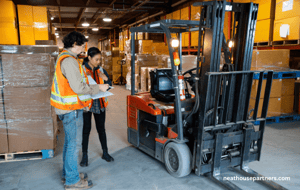Material Storage and Fire Safety - Are You Following the Law?
Material Storage and Fire Safety - Are You Following the Law?
James Rowland
Commercial Director James leads Account Management, Sales and Marketing at Neathouse Partners.Date
26 June 2023Updated
20 March 2024
Table of contents
Related articles
Tags
As a small business owner, it is crucial to prioritise fire safety when it comes to storing materials in your workplace.
Failure to comply with fire safety regulations can have severe consequences, including extensive damage, disruptions to your business operations, and legal liabilities.
Read on for a simple guide to understanding and meeting your obligations regarding material storage and fire safety.
Understanding the Risk and Ensuring Compliance
In the UK, the Regulatory Reform (Fire Safety) Order 2005 outlines the obligations that businesses must meet to ensure fire safety.
By carefully assessing potential risks and hazards, you can identify areas for improvement and implement measures to mitigate fire-related risks effectively.
When it comes to material storage, the guidance refers to your practice of storing various types of materials, such as raw materials, finished products, flammable liquids, and waste materials, in designated areas within your workplace.
This can include both indoor and outdoor storage areas, and to ensure compliance with fire safety regulations, conducting a comprehensive fire risk assessment of your premises is essential.
Taking these steps not only helps protect your business but also safeguards the well-being of your employees and preserves the integrity of your operations.
Location and Layout Precautions
To minimise fire risks associated with material storage, you should consider the following measures:
- Risk Assessment: Conduct a thorough risk assessment of your premises, considering factors such as the type and combustibility of materials, building construction, neighbouring buildings, and the presence of flammable substances.
- Maintain Safe Distance: Keep a safe distance between your material storage and buildings. Ensure that individual stacks do not exceed a maximum height of 6 meters. Keep your storage at least 10 meters away from all buildings and a minimum of 2 meters from the site boundary. Note that in some cases, greater distances may be necessary depending on the severity of the exposure hazard.
- Gangways and Separation: Separate stacks with appropriate gangways, ideally 2 meters wide. These gangways serve multiple purposes, including inspection access and providing the Fire Brigade with adequate access. Adjust the width of the gangways to accommodate higher storage levels and mitigate the risk of collapse.
- Pay Attention to Hazardous Materials: Take extra care when storing idle timber pallets and plastic crates. Limit the quantities of such materials as much as possible and observe the recommended separation distances.
- Safe Storage of Flammable Liquids: If you store flammable liquids in the open, make sure you have appropriate arrangements in place for safe containment. Additionally, assess the location of these liquids to ensure adequate spatial separation as mentioned above.
Waste Materials
Proper disposal and storage of waste materials are essential for fire safety.
Here are some recommendations:
- Minimise Waste: Keep the amount of waste on your premises to a minimum.
- Secure Bins or Skips: Store waste in securely positioned bins or skips located at least 10 meters away from buildings and 2 meters from the site boundary. If achieving the recommended spatial separation is challenging, use lockable metal containers placed as far as practicable from buildings and plants.
- Consider City Center Locations: In city centre or retail/industrial park settings, collaborate with building owners, managing agents, and other tenants to find practical waste control solutions that minimise the risk of arson or accidental ignition.
Premises Security
Establishing effective perimeter security is crucial for preventing unauthorised access and safeguarding your material storage areas.
Consider implementing the following measures:
- Install Security Fencing: Erect security fencing around your outside storage area to control access.
- Utilise CCTV and Lighting: Install detector-activated, remotely monitored CCTV systems and adequate security lighting to enhance surveillance and deter potential intruders
- Implement Access Control: Use access control measures to regulate entry into the storage area and ensure only authorised personnel have access.
General Fire Precautions
To enhance fire safety in your workplace, follow these general precautions:
- Maintain Good Housekeeping: Regularly inspect your premises to ensure good standards of housekeeping. Remove accumulated broken pallets, waste packaging, and other refuse that may pose a fire risk.
- Prohibit Smoking: Strictly prohibit smoking in the material storage area to eliminate the risk of accidental fires.
- Implement a Hot Work Permit System: If your business involves activities such as welding or cutting, establish a hot work permit system to control potential fire hazards.
- Manage Vegetation: Cut back and remove undergrowth, grass, and weeds near the storage area to minimise the risk of fire spread.
- Have Emergency Procedures: Develop documented emergency and closedown procedures to ensure a swift response in the event of a fire.
- Ensure Fire Brigade Access: Maintain clear access for the Fire Brigade, allowing them to reach your storage area quickly if needed.
Fire Safety Training and Employee Awareness
Alongside implementing preventive measures and complying with regulations, providing fire safety training and regular refresher training to your employees is vital.
Educating your staff on fire prevention, detection, and response can significantly reduce the risk of fires and ensure swift and efficient evacuation in case of an emergency.
Train your employees on the proper use of fire extinguishers, emergency exit routes, and the importance of reporting any potential fire hazards.
By fostering a culture of fire safety awareness, you empower your workforce to actively contribute to maintaining a secure workplace environment.
Regular Inspections and Maintenance
Regular inspections and maintenance are crucial for ensuring ongoing fire safety in your material storage areas.
Conduct routine checks to identify any potential fire hazards, such as damaged electrical wiring, flammable materials stored inappropriately, or blocked fire exits.
Maintain a comprehensive record of inspections, repairs, and maintenance activities to demonstrate your commitment to fire safety compliance.
Address any identified issues promptly and keep all fire safety equipment, such as fire extinguishers and alarms, in proper working condition.
Emergency Preparedness and Evacuation Plans
Having well-defined emergency preparedness and evacuation plans is essential for protecting lives and minimising property damage in the event of a fire.
- Develop clear evacuation procedures, ensuring that all employees are aware of the nearest emergency exits, assembly points, and designated personnel responsible for accounting for staff during evacuations.
- Regularly conduct fire drills to familiarise employees with the evacuation process and test the effectiveness of your emergency plans.
- Additionally, establish communication protocols to quickly alert employees in case of a fire emergency and ensure that emergency contact information is readily available.
Consequences of Non-Compliance
Non-compliance with fire safety regulations can have severe consequences for your small business.
In addition to the risks of property damage, injuries, and loss of life, you may face legal penalties, fines, and potential lawsuits. Insurance coverage may also be affected if fire safety measures are not appropriately implemented.
This is highlighted in the case of Thomas Todd, Jamie Todd, and Bryan Walker, The Environment Agency discovered their illegal storage of waste at the former Bowman's Site, which resulted in numerous fire regulation violations.
Thomas and Jamie Todd received prison sentences and were disqualified from acting as business directors for five years, while Bryan Walker received a community order and the same disqualification.
The site lacked a fire prevention plan, had unsafe waste stacking practices, and posed health risks.
The company's permit was suspended, and subsequent waste work on the site was also conducted unsafely. The defendants' actions were deemed as flagrant breaches of environmental law, with the judge emphasising the non-existent fire safeguards.
Non-compliance not only risks widespread harm to people, places, and the environment but also invites legal consequences and reputational damage.
Next Steps
For more guidance on ensuring material storage and fire safety compliance, as well as any other employment law, health & safety, or HR concerns, reach out to Neathouse Partners.
Our team of experts is dedicated to helping small businesses thrive and overcome challenges, so call us on 01244 893776 for further support.
Related blog posts

Driving Safety Innovation: The Future of Enhanced Safety for Employers

Health & Safety Updates – UK Regulatory Outlook January/February 2024

Forklift Truck Workplace Safety
Have questions?
Get in touch today
Contact us, and our team will get back to you within 24 hours. We value your questions and are committed to getting them answered quickly.


Hello! I am Nicky
Just fill in the form below with your details, and I will arrange for a member of our team to give you a call.
By clicking, you agree to our Privacy Policy






